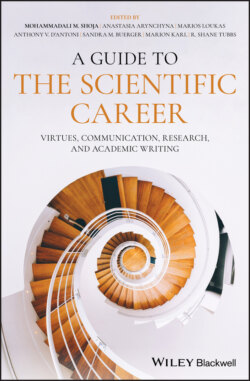Читать книгу A Guide to the Scientific Career - Группа авторов - Страница 62
5.6 Importance of Feedback
ОглавлениеThe Dunning‐Kruger effect describes how people are unaware of their incompetence and fail to take self‐improvement measures to rid the incompetence. Feedback plays a very crucial role in reversing this thought process and improving self‐awareness. Individuals who are overconfident will perform tasks that they are not adequately equipped to undertake and attempt tasks without evaluating for risk. For those without confidence, they may not be able to work independently or may experience severe levels of anxiety and stress when working alone, even when others consider them to be competent. Competence is defined as the “habitual and judicious use of communication, knowledge, technical skills, critical reasoning, emotions, values, and reflection in daily practice for the benefit of the individual and community being served” (Epstein and Hundert 2002). Competence is a cognitive and integrative function: acquiring and using knowledge to solve problems that require confidence and vice‐versa. However, personal confidence and experience have been found not to serve as a direct predictor of competence (Morgan and Cleave‐Hogg 2002; Stewart et al. 2000). Confidence represents a judgment, which influences whether an individual is willing or not to undertake an activity; therefore, it is not necessarily based on actual levels of competence.
Confidence, like art, never comes from having all the answers; it comes from being open to all the questions.
– Earl Gray Stevens (cited by Merkel and Al‐Falaij, 2003)
The Dunning‐Kruger effect has been replicated among undergraduate students completing a classroom exam (Dunning et al. 2003), medical students assessing their interviewing skills, medical students evaluating their performance on clerkships (Edwards et al. 2003), and medical laboratory technicians evaluating their job expertise and problem‐solving ability in the workplace (Haun et al. 2000). Consistent with the Kruger and Dunning studies, other studies have shown that overconfident students, yet incompetent, evaluated their performance nearly the same as students that performed well. In medicine, self‐evaluation and self‐assessment can measure one's confidence in relation to competence (Stewart et al. 2000). Medical students' levels of confidence in the performance of specific skills and patient management correlated to their clinical experience, but neither clinical experience nor level of confidence was able to predict outcomes in standardized performance exams (Morgan and Cleave‐Hogg 2002). These findings may be accounted for by the differences in educational experiences; however, the lack of correlation between educational experience and outcomes on standardized assessments requires further explanation and research.
The aforementioned self‐assessment and self‐evaluation tools are helpful because they enable advisors to focus on the individuals who scored poorly; thus providing feedback to help them improve or at least begin to recognize their own limitations. It is an essential practice to recalibrate your ability to self‐assess, as it provides motivation to seek training or assistance and better yourself. Furthermore, the ability to assess your knowledge and learning needs is important in continuing educational activities to address specific gaps in knowledge. Experience may improve the accuracy of self‐assessment with more intensive feedback. This can help in identifying and correcting deficiencies. Some ideas to incorporate such feedback include self‐assessment of your ability during or prior to training, modeling of self‐assessment and self‐directed learning by teachers and mentors, introduction of self‐assessment skills during early education, and continuous feedback and constructive criticism during performances of any sort.
